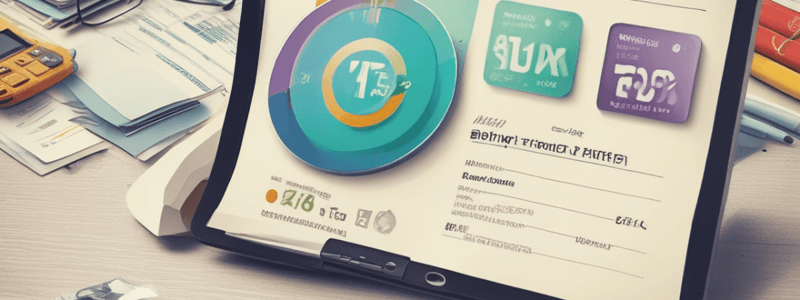Podcast
Questions and Answers
What information is typically included in a credit report?
What information is typically included in a credit report?
- Education and family background
- Employment history and income
- Criminal records and medical history
- Personal information, credit accounts, and payment history (correct)
What is the main purpose of a credit score?
What is the main purpose of a credit score?
- To monitor payment history
- To determine loan interest rates
- To track credit utilization
- To evaluate creditworthiness (correct)
What percentage of available credit is considered ideal for credit utilization?
What percentage of available credit is considered ideal for credit utilization?
- Below 20%
- Below 50%
- Below 30% (correct)
- Below 10%
What strategy can help improve credit utilization?
What strategy can help improve credit utilization?
Which of the following can negatively impact credit scores?
Which of the following can negatively impact credit scores?
What is the first step in the dispute process for errors on credit reports?
What is the first step in the dispute process for errors on credit reports?
Why is it important to monitor credit reports and scores regularly?
Why is it important to monitor credit reports and scores regularly?
What percentage of credit scores is attributed to payment history?
What percentage of credit scores is attributed to payment history?
What is the range of credit scores?
What is the range of credit scores?
What is the main purpose of credit counseling or debt management plans?
What is the main purpose of credit counseling or debt management plans?
Flashcards are hidden until you start studying
Study Notes
Credit Reports
- A credit report is a detailed record of an individual's credit history, including:
- Personal information (name, address, SSN)
- Credit accounts (loans, credit cards, mortgages)
- Payment history (on-time, late, missed payments)
- Credit inquiries (requests for credit)
- Public records (bankruptcies, foreclosures, tax liens)
- Credit reports are maintained by three major credit bureaus: Equifax, Experian, and TransUnion
- Individuals can request a free credit report from each bureau once a year from AnnualCreditReport.com
Credit Scores
- A credit score is a three-digit number that represents an individual's creditworthiness
- Credit scores range from 300 to 850, with higher scores indicating better credit
- Credit scores are calculated based on:
- Payment history (35%)
- Credit utilization (30%)
- Length of credit history (15%)
- Credit mix (10%)
- New credit (10%)
- Good credit scores can lead to lower interest rates, better loan terms, and lower insurance premiums
Credit Utilization
- Credit utilization refers to the percentage of available credit being used
- Ideal credit utilization is below 30% for all credit accounts and individual accounts
- High credit utilization can negatively impact credit scores
- Strategies to improve credit utilization:
- Pay down debt
- Increase credit limits
- Avoid new credit inquiries
Repair Strategies
- Identify and dispute errors on credit reports
- Pay bills on time and in full
- Reduce debt and credit utilization
- Avoid negative marks (late payments, collections, bankruptcies)
- Monitor credit reports and scores regularly
- Consider credit counseling or debt management plans
Disputing Errors
- Errors on credit reports can be disputed with the credit bureaus
- Common errors to dispute:
- Inaccurate personal information
- Incorrect credit account information
- Erroneous public records
- Dispute process:
- Submit a dispute letter to the credit bureau
- Provide supporting documentation
- Wait for the bureau to investigate and respond
- Follow up with the creditor if necessary
Studying That Suits You
Use AI to generate personalized quizzes and flashcards to suit your learning preferences.




